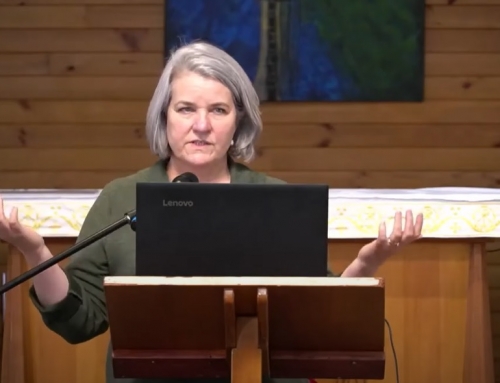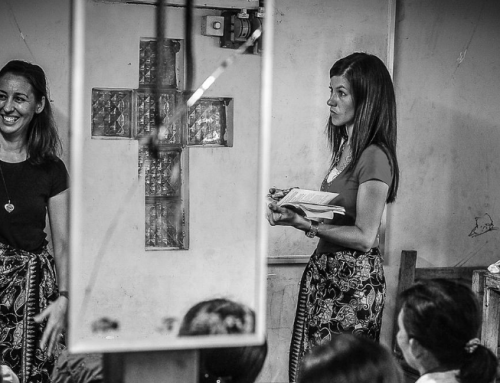In our household, parenting is a joint project which we each approach in our own unique way.
Byron takes the lead in providing career planning advice and money management discussions. He’s more likely to challenge our children physically and intellectually, sparring with the boys and affirming the girls of their dignity when their dress becomes a bit revealing. He brings an objectivity to family discussions and can inspire them to think proactively about their futures, to be producers and not just consumers, to boldly engage with the world not just for what can be gained, but for how they can improve it.
Francine is more attuned to the emotional world of our teenagers and young adults and will express her care through her nurturing and planning for family meals and gatherings. She focuses on creating the conditions to foster relationships and home-based memories. She seeks to draw them close in gentle hugs and intimate conversations, to provide a refuge in the home and in her heart where they can find comfort in a world which is challenging and sometimes hostile.
Neither is better than the other – just different. Unsurprisingly, they tend to broadly reflect the natural charism of masculine and feminine expressions of love. Both dimensions are needed as, together they bring a holistic balance to our parenting that neither of us could achieve as well on our own. So while every parent will parent in their own unique way, it is abundantly evident that mother and father each in their own way bring some distinct character to the task.
The Church: Like Father, Like Mother
From what we observe to be true in the small community of family life, we can draw a helpful analogy for the larger community of church-life. Similar to our experience in our family, Church can be best encountered through the balancing effect of its analogous paternal and maternal dimensions. The paternal dimension, evident through the Church’s apostolic teaching authority, presents us with a motivating vision and ideal. It provides the guidelines, through its Canon laws and moral teachings, to direct us to a more Godly lifestyle; to be whole and peace-filled persons. Like a light on the hill (to use one of Pope Francis’ images), the Church in its fatherly concern illuminates the way of true happiness, which is holiness.
The maternal dimension can be thought of as the encounter of merciful love which accompanies us as we strive… and fail… and strive again in our efforts to be whole and peace-filled persons. It encourages us, comforts us and draws us close in our struggles as we seek a deeper holiness among the sometimes truly awful messiness of our lives. It is the field hospital (another of Pope Francis’ images) to which we retreat for the treatment of our worldly wounds. It’s the sheltered place of recovery when life overwhelms us.
Like our own parenting model, neither dimension of the Church, is better than the other. They are different and both are needed. Both are essential for the fullness of life and faith. Each acts to temper and balance the other and so avoid the extremes of each – harsh legalism on one hand and erratic subjectivity on the other.
Although she constantly holds up the call to perfection and asks for a fuller response to God, “the Church must accompany with attention and care the weakest of her children, who show signs of a wounded and troubled love, by restoring in them hope and confidence, like the beacon of a lighthouse in a port or a torch carried among the people to enlighten those who have lost their way or who are in the midst of a storm”. Let us not forget that the Church’s task is often like that of a field hospital. AL 297
Nothing Changes…
Pope Francis is bracingly clear on doctrine and reaffirms its importance. For example on marriage he says:
“In order to avoid all misunderstanding, I would point out that in no way must the Church desist from proposing the full ideal of marriage, God’s plan in all its grandeur… A lukewarm attitude, any kind of relativism, or an undue reticence in proposing that ideal, would be a lack of fidelity to the Gospel and also of love on the part of the Church for young people themselves. To show understanding in the face of exceptional situations never implies dimming the light of the fuller ideal, or proposing less than what Jesus offers to the human being.” AL307
In today’s context of rapid cultural change, the constancy of the teaching of the Church is like the lighthouse buffeted by waves and wind; it holds steady in the storm, beaming the light of truth through the darkness. It has never been more needed.
Yet something is profoundly different…
While doctrine is not changing, Pope Francis is challenging us to think differently about how we respond pastorally. Typically, when faced with a difficult pastoral situation, the approach has been to look to doctrine and canon law for an answer, and to apply “rigorous pastoral care which leaves no room for confusion” (AL 308). Pope Francis advocates a different approach; one that examines the uniqueness of every pastoral situation, “is attentive to the goodness which the Holy Spirit sows in the midst of human weakness”, accompanies the individual “with mercy and patience” and enters “into the reality of other people’s lives”. (AL 308)
Put simply Pope Francis is calling us to re-examine how to put the law into practice. It’s the ‘how’ that is different and also more difficult to get right.
“In such difficult situations of need, the Church must be particularly concerned to offer understanding, comfort and acceptance, rather than imposing straightaway a set of rules that only lead people to feel judged and abandoned by the very Mother called to show them God’s mercy.” AL 49
Pope Francis is saying that it is insufficient simply to drop the truth on people and then self-righteously walk away. He is deeply concerned that the Church might become a barren place, inattentive to the suffering of those in ‘irregular’ situations.
The Synod addressed various situations of weakness or imperfection. Here I would like to reiterate something I sought to make clear to the whole Church, lest we take the wrong path: “There are two ways of thinking which recur throughout the Church’s history: casting off and reinstating. The Church’s way, from the time of the Council of Jerusalem, has always been the way of Jesus, the way of mercy and reinstatement… The way of the Church is not to condemn anyone for ever; it is to pour out the balm of God’s mercy on all those who ask for it with a sincere heart. AL 296
But equally, Pope Francis is not advocating a free-for-all; he insists that “For this discernment to happen, the following conditions must necessarily be present: humility, discretion and love for the Church and her teaching, in a sincere search for God’s will and a desire to make a more perfect response to it”. (AL 300) Thus, Pope Francis goes to great lengths to articulate a prayerful and thorough process of discernment for pastors to employ when accompanying people in difficult situations.
Conclusion
But I sincerely believe that Jesus wants a Church attentive to the goodness which the Holy Spirit sows in the midst of human weakness, a Mother who, while clearly expressing her objective teaching, “always does what good she can, even if in the process, her shoes get soiled by the mud of the street” AL308
We live in the grey areas between the black and white clarity of objective morality. Although the teaching is clear and compelling, we all fail to attain its fullness at some level. Living in the grey is our human reality – the outcome of original sin. As a Church, we must remain conscious of who we are called to be. At the same time, love and mercy should compel us always to search for the good in every person.
The Church is both a lighthouse and a field hospital, doctrine and mercy. Both aspects are necessary. This is the gift and genius of the Church and, like parenting, is something we should celebrate and embrace, even when at times it feels confusing and uncomfortable.
Pope Francis invites us to join him in exploring the dynamic tension between the necessity to present the ideal of God’s vision for life and love, and the need for a merciful response in the midst of failure. With Amoris Laetitia, he is calling us into active engagement with the complexity of how we lovingly live God’s vision for life and love. Nothing changes, yet everything changes.
“A Holy Year devoted to mercy …. sets us in the context of a pastoral discernment filled with merciful love, which is ever ready to understand, forgive, accompany, hope, and above all integrate. That is the mindset which should prevail in the Church.” AL 311, 312





